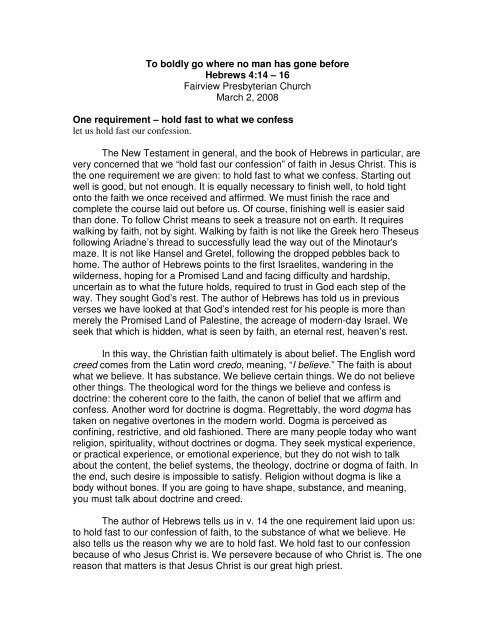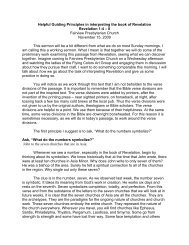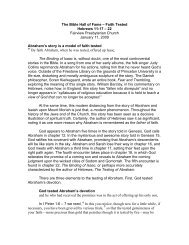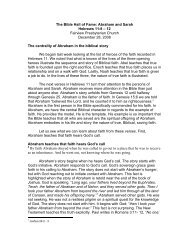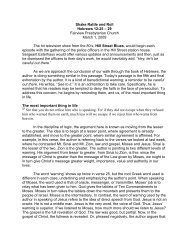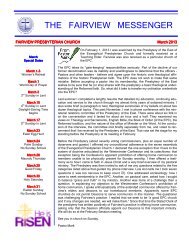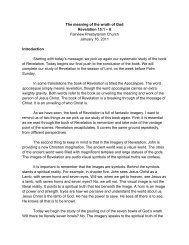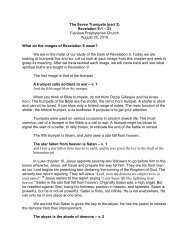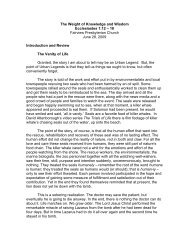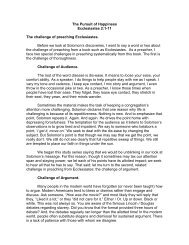To boldly go where no man has gone before Hebrews 4:14 – 16 ...
To boldly go where no man has gone before Hebrews 4:14 – 16 ...
To boldly go where no man has gone before Hebrews 4:14 – 16 ...
Create successful ePaper yourself
Turn your PDF publications into a flip-book with our unique Google optimized e-Paper software.
<strong>To</strong> <strong>boldly</strong> <strong>go</strong> <strong>where</strong> <strong>no</strong> <strong>man</strong> <strong>has</strong> <strong>go</strong>ne <strong>before</strong><br />
<strong>Hebrews</strong> 4:<strong>14</strong> <strong>–</strong> <strong>16</strong><br />
Fairview Presbyterian Church<br />
March 2, 2008<br />
One requirement <strong>–</strong> hold fast to what we confess<br />
let us hold fast our confession.<br />
The New Testament in general, and the book of <strong>Hebrews</strong> in particular, are<br />
very concerned that we “hold fast our confession” of faith in Jesus Christ. This is<br />
the one requirement we are given: to hold fast to what we confess. Starting out<br />
well is <strong>go</strong>od, but <strong>no</strong>t e<strong>no</strong>ugh. It is equally necessary to finish well, to hold tight<br />
onto the faith we once received and affirmed. We must finish the race and<br />
complete the course laid out <strong>before</strong> us. Of course, finishing well is easier said<br />
than done. <strong>To</strong> follow Christ means to seek a treasure <strong>no</strong>t on earth. It requires<br />
walking by faith, <strong>no</strong>t by sight. Walking by faith is <strong>no</strong>t like the Greek hero Theseus<br />
following Ariadne’s thread to successfully lead the way out of the Mi<strong>no</strong>taur's<br />
maze. It is <strong>no</strong>t like Hansel and Gretel, following the dropped pebbles back to<br />
home. The author of <strong>Hebrews</strong> points to the first Israelites, wandering in the<br />
wilderness, hoping for a Promised Land and facing difficulty and hardship,<br />
uncertain as to what the future holds, required to trust in God each step of the<br />
way. They sought God’s rest. The author of <strong>Hebrews</strong> <strong>has</strong> told us in previous<br />
verses we have looked at that God’s intended rest for his people is more than<br />
merely the Promised Land of Palestine, the acreage of modern-day Israel. We<br />
seek that which is hidden, what is seen by faith, an eternal rest, heaven’s rest.<br />
In this way, the Christian faith ultimately is about belief. The English word<br />
creed comes from the Latin word credo, meaning, “I believe.” The faith is about<br />
what we believe. It <strong>has</strong> substance. We believe certain things. We do <strong>no</strong>t believe<br />
other things. The theological word for the things we believe and confess is<br />
doctrine: the coherent core to the faith, the ca<strong>no</strong>n of belief that we affirm and<br />
confess. A<strong>no</strong>ther word for doctrine is dogma. Regrettably, the word dogma <strong>has</strong><br />
taken on negative overtones in the modern world. Dogma is perceived as<br />
confining, restrictive, and old fashioned. There are <strong>man</strong>y people today who want<br />
religion, spirituality, without doctrines or dogma. They seek mystical experience,<br />
or practical experience, or emotional experience, but they do <strong>no</strong>t wish to talk<br />
about the content, the belief systems, the theology, doctrine or dogma of faith. In<br />
the end, such desire is impossible to satisfy. Religion without dogma is like a<br />
body without bones. If you are <strong>go</strong>ing to have shape, substance, and meaning,<br />
you must talk about doctrine and creed.<br />
The author of <strong>Hebrews</strong> tells us in v. <strong>14</strong> the one requirement laid upon us:<br />
to hold fast to our confession of faith, to the substance of what we believe. He<br />
also tells us the reason why we are to hold fast. We hold fast to our confession<br />
because of who Jesus Christ is. We persevere because of who Christ is. The one<br />
reason that matters is that Jesus Christ is our great high priest.
One reason <strong>–</strong> Jesus Christ is our great high priest<br />
<strong>14</strong> Since then we have a great high priest<br />
We are told that Jesus Christ is our great high priest. He is the reason why<br />
we seek to persevere in our walk of faith. In his office as high priest, he gives to<br />
us <strong>man</strong>y blessings. Our k<strong>no</strong>wledge of his greatness encourages us to carry on in<br />
spite of the difficulties we may face in life. The author of <strong>Hebrews</strong> suggests three<br />
facets to the greatness of Jesus Christ’s role as high priest. The first is that, as<br />
our high priest, he is qualified.<br />
Jesus Christ, our high priest, is qualified<br />
who <strong>has</strong> passed through the heavens, Jesus, the Son of God,<br />
The phrase used by the author in this verse, who <strong>has</strong> passed through the<br />
heavens, is very significant. It <strong>has</strong> multiple levels of meaning. On the one hand, it<br />
means just what it says, that Jesus Christ <strong>has</strong> passed through the heavens to<br />
take his seat at the right hand of God. We celebrate this event on Ascension<br />
Day, forty days after Easter, when Christ ascended into heaven. The ancient<br />
world had three meanings for the word heaven. The first heaven is the place<br />
<strong>where</strong> birds fly, what we think of as the sky. The second heaven is the place<br />
<strong>where</strong> the stars are, what we think of as space. The third heaven is the place<br />
<strong>where</strong> God’s presence dwells in a special way, what we typically mean when we<br />
use the word heaven. Therefore, at its simplest, the author means that Jesus<br />
Christ <strong>has</strong> ascended to God’s presence.<br />
However, things do <strong>no</strong>t stop there. There is a<strong>no</strong>ther sense behind the idea<br />
of passing through <strong>–</strong> and this <strong>has</strong> to do with the order of being. In our world, we<br />
understand that there is a distinction, an increase in the nature of being, from<br />
inanimate objects, on to plant life, to animal life and finally hu<strong>man</strong> life. However,<br />
the order of being does <strong>no</strong>t stop with the seen world. The Bible does <strong>no</strong>t tell us a<br />
great deal about the unseen world, but it does speak of angels, archangels,<br />
cherubim, and seraphim. When the author of <strong>Hebrews</strong> speaks of passing<br />
through, he means that Jesus Christ <strong>has</strong> passed<br />
Through all ranks of creatures,<br />
<strong>To</strong> the central height,<br />
<strong>To</strong> the throne of Godhead<br />
<strong>To</strong> the Father’s breast 1<br />
Jesus Christ <strong>has</strong> <strong>no</strong>t simply ascended into heaven, but he <strong>has</strong> also ascended to<br />
the highest rank of name, power and authority in all of existence. He is<br />
transcended, seated at God’s right hand, and heaven itself can<strong>no</strong>t hold him.<br />
1 From the hymn, At the Name of Jesus, v. 3.
In addition, there is a third level of meaning behind the phrase passed<br />
through. <strong>To</strong> understand this meaning, we must first consider some aspects of<br />
ancient Jewish worship. The Jewish Temple proper consisted of two parts: the<br />
Holy Place and the Holiest of Holies. Around the Temple stood various<br />
courtyards, and each courtyard was restricted as to who was permitted to enter.<br />
In this, it is similar to modern American embassies around the world. An<br />
embassy is a secure place, with <strong>man</strong>y barriers and restrictions. The average<br />
foreigner can access the areas reserved for visa applications, though <strong>no</strong>wadays,<br />
usually only with a prior appointment. American citizens are easily and<br />
immediately welcomed into the citizen services office of the embassy. Behind<br />
those walls, guarded by U.S. Marines, only those who are employed by the<br />
embassy are typically permitted. All others must have special approval to enter.<br />
There are further divisions still: a section reserved for only American citizen<br />
diplomats, offices for secure communications, the ambassador’s office, and so<br />
on: the more important the person, the greater the barriers and restrictions.<br />
In ancient Jerusalem, the average person could, of course, walk past the<br />
Temple. The outer most courtyard was set apart for the Gentiles <strong>–</strong> <strong>no</strong>n-Jews<br />
who, for whatever reason, sought to enter. But they could pass <strong>no</strong> further. Next,<br />
there was a separate courtyard for Jewish women. There was a<strong>no</strong>ther for Jewish<br />
men. Then, immediately surrounding the Temple proper, was the innermost<br />
courtyard, <strong>where</strong> the priests would perform their duty. The front of the Temple<br />
itself, k<strong>no</strong>wn as the Holy Place, was entered twice a day by a priest assigned to<br />
the task. It was a high privilege to serve in the Holy Place and the responsibility<br />
was assigned among the <strong>man</strong>y priests by a lottery system. By the time of Jesus,<br />
there were so <strong>man</strong>y priests that the privilege of serving in the Holy Place might<br />
happen only once in a lifetime. Finally, the innermost enclave of the Temple, the<br />
Holiest of Holies, was entered only once per year, and only by the High Priest,<br />
and only after elaborate sacrifice and preparation. The High Priest would pass<br />
through all of the courtyards, the barriers and, for a brief time, enter into the<br />
presence of God.<br />
When the author of <strong>Hebrews</strong> says that Jesus Christ, the great high priest,<br />
<strong>has</strong> passed through, he means that Jesus Christ <strong>has</strong> breached the barriers that<br />
separated hu<strong>man</strong>ity from God. By his sacrifice, Jesus Christ <strong>has</strong> breached the<br />
barriers of division that separated <strong>man</strong> from God and he <strong>has</strong> taken his seat at<br />
God’s right hand <strong>–</strong> <strong>no</strong>t for a brief time, but for eternity!<br />
Jesus Christ is a qualified high priest. Further, he is a sympathetic high<br />
priest.<br />
Jesus Christ, our high priest, is sympathetic<br />
15 For we do <strong>no</strong>t have a high priest who is unable to sympathize with our<br />
weaknesses, but one who in every respect <strong>has</strong> been tempted as we are, yet without<br />
sin.
You may recall that last year around this time there was a devastating<br />
earthquake in the country of Peru. Many rightly expressed concern. Many<br />
prayed. Many nations sent relief assistance. The news of the earthquake hit the<br />
Atkinson family in a <strong>man</strong>ner that was different for <strong>man</strong>y here in America, for we<br />
knew the area <strong>where</strong> the quake did its destruction. We have traveled there. We<br />
had lived in Peru. We have stayed in the little village of Paracas, that <strong>no</strong> longer<br />
exists. We knew people affected by the quake. The nature of our sympathy was<br />
deepened and increased because of our experience.<br />
The scriptures teach that God understands. He k<strong>no</strong>ws us. He <strong>has</strong> created<br />
us. Even more, in Jesus Christ, he <strong>has</strong> become one of us. Jesus Christ himself<br />
<strong>has</strong> endured trial and suffering. Jesus Christ was exposed to everything we<br />
experience in life. For this reason, he <strong>has</strong> capacity for sympathy.<br />
Every <strong>no</strong>w and again you may meet someone who is dismissive of Jesus’<br />
ability to be sympathetic because Jesus was also sinless. Such a claim usually is<br />
dismissive of Jesus’ ability to understand temptation, since he himself never gave<br />
in to it. This is completely erroneous. In fact, only one who is sinless k<strong>no</strong>ws the<br />
full extent of temptation. We who are sinful always give in to temptation well<br />
<strong>before</strong> it reaches is apex, its full extent. We do <strong>no</strong>t k<strong>no</strong>w the greatest temptation<br />
because we have succumbed <strong>before</strong> we encounter it. In contrast, Christ<br />
experienced temptation to its fullest, more fully than you or I could imagine, and<br />
still remained true to God.<br />
Jesus is qualified to be the great high priest. He is sympathetic in his office<br />
as high priest. And, as a result of these two together, Jesus Christ is an<br />
approachable high priest.<br />
Jesus Christ, our high priest, is approachable<br />
<strong>16</strong> Let us then with confidence draw near to the throne of grace,<br />
Some Christians pray to Mary or to saints in part because they see them<br />
as being more approachable, more sympathetic, or more understanding. This is<br />
the premise behind the idea of patron saints; that the saint is more approachable<br />
and sympathetic to those who are his patrons. However, this is a serious<br />
misunderstanding of Christ’s person and accomplishment.<br />
Across town, at the moment of Jesus’ death on the cross, something very<br />
significant occurred: the heavy curtain that hung between the Holy Place and the<br />
Holiest of Holies in the Temple was torn in two, from top to bottom. The barriers<br />
that separated <strong>man</strong> from God were decisively breached in Christ’s substitutionary<br />
sacrifice on the cross. The curtain is torn. The doors stand open. The walls are<br />
breached. The divisions are overcome. The angels of God are <strong>no</strong> longer<br />
guarding the Tree of Life with flaming sword. We do <strong>no</strong>t need St. Barbara, St.<br />
Jude or St. Anthony in order to approach God. Jesus Christ, the captain of our<br />
faith, <strong>has</strong> blazed the trail. He is the only one to whom we must look. He is the
only one to whom we should turn. He is our great high priest. He <strong>has</strong> deep<br />
sympathy for us. In addition, he is approachable. He <strong>has</strong> proven it beyond doubt<br />
through the depth of his love revealed in his sacrificial death on the cross.<br />
Because of Christ’s victory and sympathy, we come with confidence into God’s<br />
presence.<br />
This leads to our final point from these verses, the one resource given to<br />
us, the privilege of coming into God’s presence in prayer.<br />
One resource <strong>–</strong> coming into God’s presence in prayer<br />
<strong>16</strong> Let us then with confidence draw near to the throne of grace, that we may receive<br />
mercy and find grace to help in time of need.<br />
The image in verse <strong>16</strong> is of drawing near to God’s throne, the throne of<br />
grace in our time of need. It is an image of prayer: of coming into God’s presence<br />
to receive from him mercy and grace. Two things should be kept in mind.<br />
The first is that we are approaching God almighty. Imagine entering the<br />
White House, or Buckingham Palace, there is a solemnity and seriousness that<br />
rightly accompanies entry into the presence of those possessing worldly power.<br />
This is fitting. In prayer, we approach God’s throne and there should be a<br />
comparable fitness in our attitude, demea<strong>no</strong>r, and deportment. God is <strong>no</strong>t a<br />
cosmic bellhop, servant or waiter and we should be wary of approaching him in a<br />
presumptuous <strong>man</strong>ner. God deserves respect. He is God. We are <strong>no</strong>t.<br />
At the same time, the author of <strong>Hebrews</strong> tells us to come <strong>boldly</strong> into God’s<br />
presence. We can come <strong>boldly</strong> into God’s presence because we are following<br />
the path blazed for us by our savior, Jesus Christ. We are <strong>no</strong>t coming <strong>boldly</strong> into<br />
his presence based upon our own merit. We do <strong>no</strong>t come based upon our<br />
<strong>go</strong>odness. We do <strong>no</strong>t come denying our sinfulness. Nevertheless, we come<br />
because of Christ and his work. He <strong>has</strong> born the penalty for our sin. In addition,<br />
he <strong>has</strong> given to us the true righteousness he <strong>has</strong> earned. We can come <strong>boldly</strong><br />
into God the Father’s presence k<strong>no</strong>wing that our debt <strong>has</strong> been paid and that we<br />
are clothed in the perfect righteousness of Christ.<br />
The opening chapters of Genesis tell the story of life in the Garden of<br />
Eden, the Temptation, the Fall and Adam and Eve’s eviction from the garden.<br />
You recall that, after eating of the forbidden fruit, Adam and Eve realize that they<br />
are naked. They take fig leaves and sew aprons for themselves and later, when<br />
God comes to visit with them in the garden, they hide. The point is that<br />
accompanying their disobedience is the arrival of shame and the attempt to hide<br />
from God. When there was <strong>no</strong> sin, there was <strong>no</strong> shame or embarrassment. In a<br />
perfect world, there would be <strong>no</strong> need for clothing. However, ours is <strong>no</strong>t a perfect<br />
world. We are clothed because of sin.
After confronting Adam and Eve, and after issuing his words of judgment<br />
upon their actions, God does something very merciful. He gives to Adam and<br />
Eve clothing made of animal skins. God helps them overcome their shame. An<br />
animal loses its life to cover their disgrace. What God does for Adam and Eve he<br />
will one day do for all who belong to him. God’s people are <strong>no</strong>w clothed in Jesus<br />
Christ: Christ <strong>has</strong> born their punishment upon the cross, and Christ gives to them<br />
his righteousness, permitting God’s people to stand <strong>before</strong> him in confidence.<br />
Because of this, the author of <strong>Hebrews</strong> calls us to draw near to God<br />
without fear. Why Because Christ <strong>has</strong> reconciled us to God. We need <strong>no</strong>t feel<br />
shame for God <strong>has</strong> clothed us as he did Adam and Eve.<br />
Say “Amen” Somebody.
Jesus the Great High Priest<br />
<strong>14</strong> Since then we have a great high priest who <strong>has</strong> passed through the heavens, Jesus,<br />
the Son of God, let us hold fast our confession. 15 For we do <strong>no</strong>t have a high priest who is<br />
unable to sympathize with our weaknesses, but one who in every respect <strong>has</strong> been<br />
tempted as we are, yet without sin. <strong>16</strong> Let us then with confidence draw near to the throne<br />
of grace, that we may receive mercy and find grace to help in time of need.<br />
2<br />
2 The Holy Bible : English Standard Version. (Wheaton: Standard Bible Society, 2001), Heb 4:<strong>14</strong>-<strong>16</strong>.


